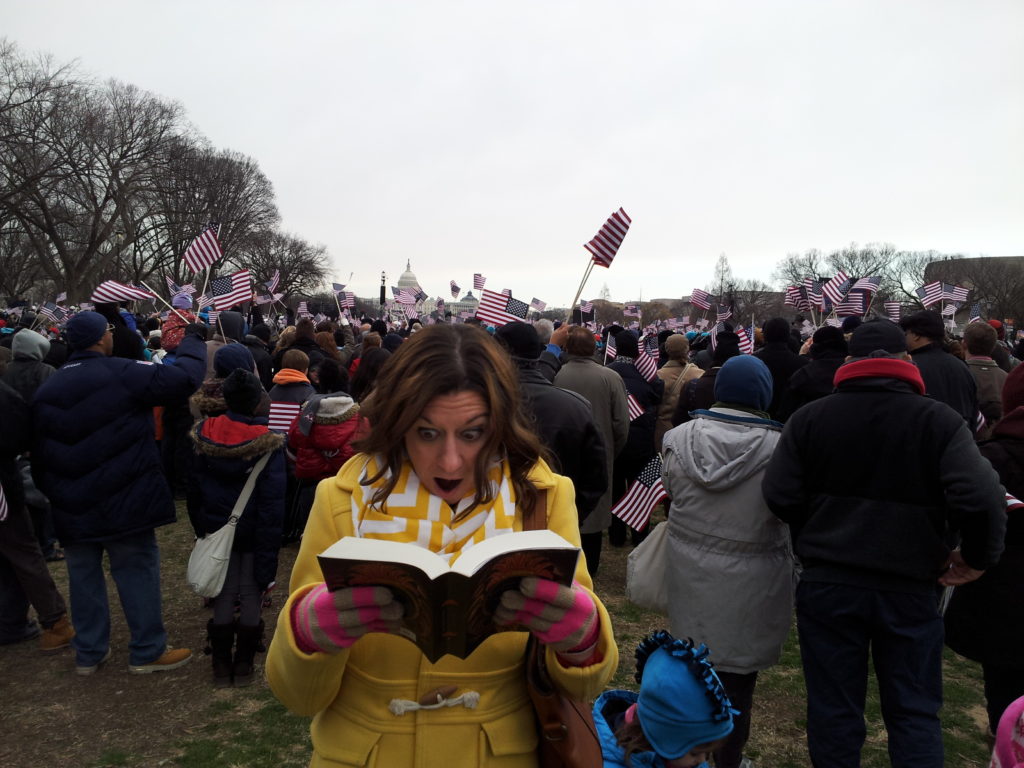I woke up Thursday, January 21, 2021 determined to live Amanda Gorman’s “The Hill We Climb” poem. I was going to be brave enough to see and be light. I was on the look out for the emergence of the battered and the beautiful – both in myself and in others. I promised to think about what just redemption was and what in my life specifically needed that reckoning.
I brought my yellow coat that was hanging in the basement on its way to be donated because I thought I was too old to wear it, upstairs for another try.
After all, I have two daughters, and I want to show them how to live fiercely and part of that means having the confidence to hope, and dare, and be bold enough to follow and then create with their imagination.
I left for a run just as a sliver of orange revealed itself to the world tilting toward it, and I came home 45 minutes later sweaty and exhilarated and in the presence of my two girls fighting over waffles and sweatpants.
It went like this, and I quote:
Hadley: MAKE ME SOME WAFFLES!
Harper: NO!
Hadley: THEN GIVE ME YOUR PANTS!
Harper: NO!
Hadley: I GAVE YOU YOUR PANTS! TAKE ‘EM OFF!
Harper: YOU CAN’T MAKE ME MAKE YOU WAFFLES OR TAKE OFF MY PANTS. BESIDES, I WILL JUST PUT ON ANOTHER PAIR. I HAVE LOTS MORE PANTS.
Not broken, simply unfinished. Not broken, simply unfinished, I said to myself as I filled my water bottle up and squinted at the sun’s rays streaming through our kitchen window revealing everything: dirt behind the sink, in the window sill, crusty batter on the counter, egg on the stove from being cracked on the side of the skillet.
All this I failed to see, or maybe I succeeded in ignoring and now I am facing it, and I know Ms. Gorman was not referring to the cleanliness of our kitchens as the foundation for just redemption, but this is where I am, and this is where her poetry is meeting me: in my dirty kitchen with my daughters who I hope will find something to eat and also keep their pants on for the remainder of the day.
I printed the transcript of her poem on Wednesday at 1:30 in the afternoon. At that time, the site I found it on, “The Hill,” showed her poem had been shared 5,557 times. Not liked – shared.
That evening my Facebook feed was filled with lines from her poem, and pictures of her in her yellow jacket sharing her words with the world. Scientists, doctors, teachers, stay at home parents, pastors, atheists, democrats and republicans shared her words.
No longer are we allowed to declare we don’t “get” poetry. Poetry came to us Wednesday afternoon, and we got it. We got it, and we want in on it.
I’m not suggesting we all become poets, but I am daring us to tilt our unfinished selves toward the light and then revealing all we have and all we are to the world so we can write “a new chapter,” and “offer hope and laughter” not just to ourselves but to everyone.
I am suggesting we use poetry to help us see.
Resources:
I have shared Julio Noboa Polanco’s “Identity” poem almost every year I’ve been a teacher. It is a beautiful poem rich in metaphor. Plus, he was a teenager when he wrote it. (This link has a worksheet for anyone who would like to dig further. I always assigned my students to write their own “Identity” poems.)
Tania Runyan’s How To Read A Poem, and How To Write A Poem are two of the friendliest, inspiring teaching resources on playing with poetry I’ve read. I use them frequently.
Jacqueline Woodson’s Brown Girl Dreaming is a layered memoir in free verse. Pay attention to her, “How to Listen” haikus, and maybe write some of your own: How to See, How to Tell, How to be the Light. The Poet X is a book I’m calling, “the story of Eve I wish I had growing up,” and I argue that poetry is a character that passionately drives the plot forward in Angie Thomas’ On the Come Up.
If you’re looking for a place to learn, discuss, and share poetry (and not just poetry – all kinds of stories), I highly recommend Tweetspeak Poetry. Yes, this is my publisher, but before I went to graduate school, before I had any dream of writing books (or writing anything at all), this was my metaphorical front porch swing – a safe, friendly, beautiful place to sit with and think about the challenging, joyful, stories of our lives, and consider how to tell them well.
Because telling our stories well – turning ourselves toward the light and revealing not just our truth but thee truth – is how we become light.


Leave a Reply